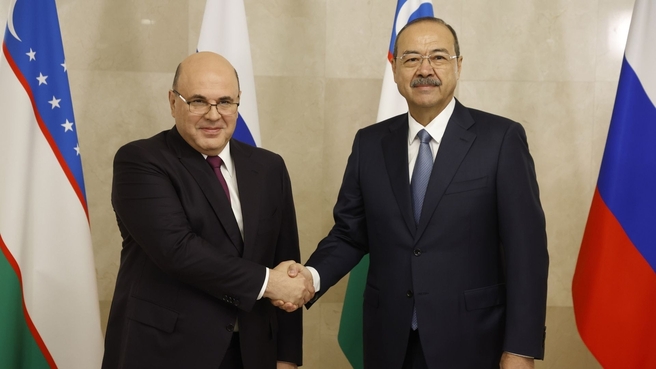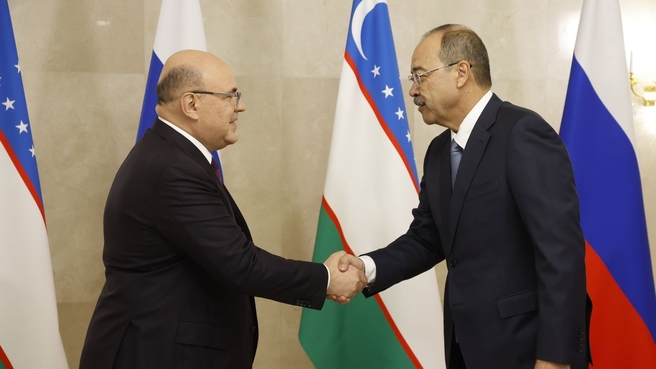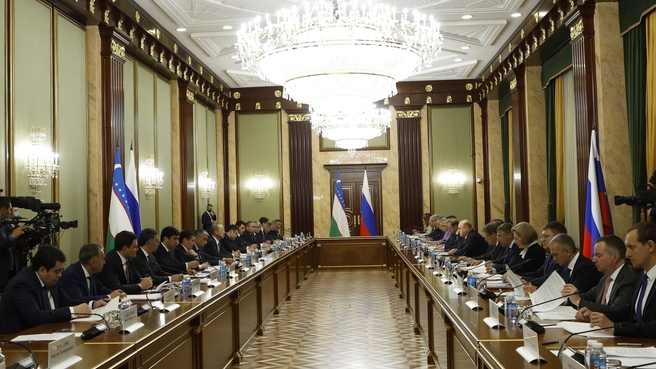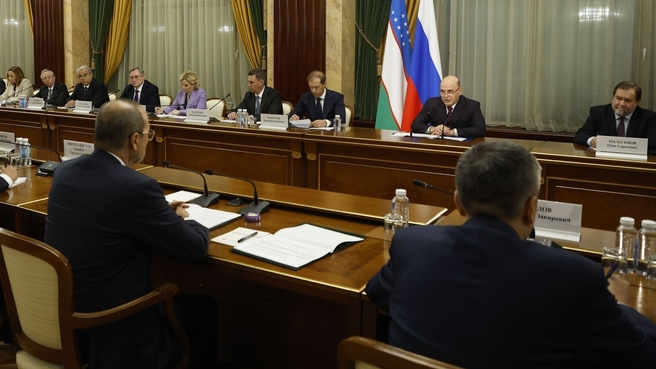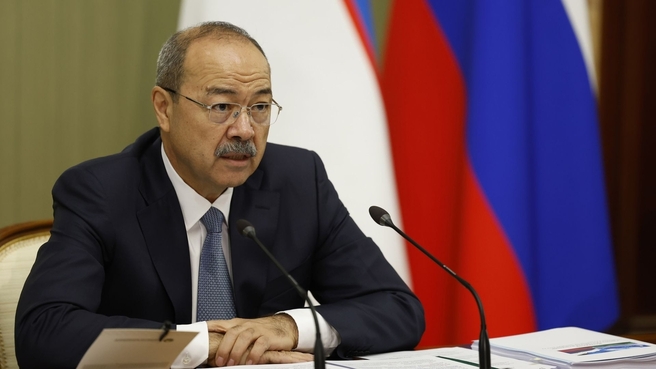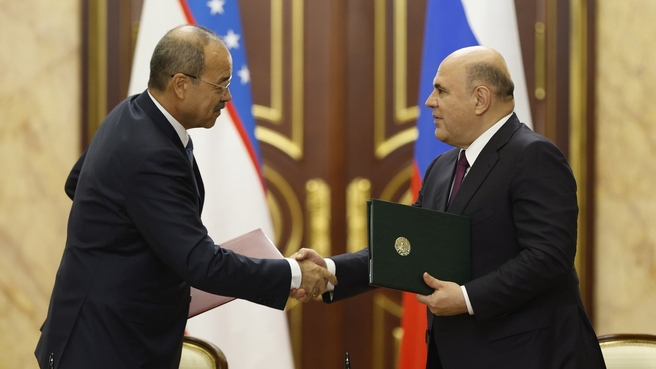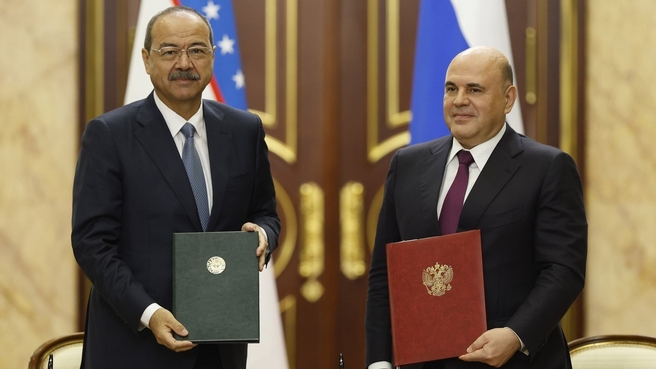Prime Minister of Russia Mikhail Mishustin and Prime Minister of Uzbekistan Abdulla Aripov held the 4th meeting of the Russia-Uzbekistan Joint Commission at the level of heads of government.
Documents signed following the meeting
Excerpts from the transcript:
Mikhail Mishustin: Mr Aripov, colleagues, friends.
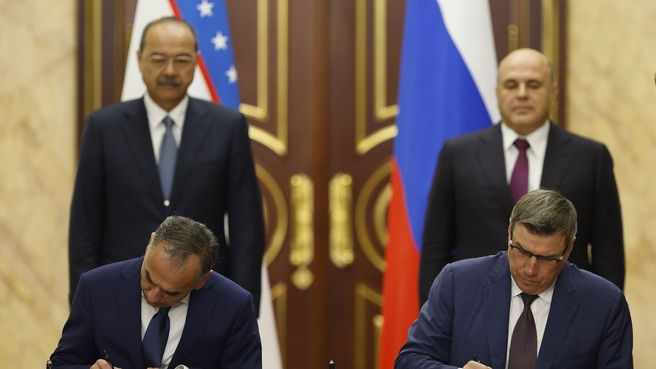
Signing documents following the meeting of the Russia-Uzbekistan Joint Commission at the level of heads of government, with Mikhail Mishustin and Prime Minister of Uzbekistan Abdulla Aripov. Documents were signed by Deputy Minister of Industry and Trade of Russia Oleg Bocharov and Deputy Minister of Investment, Industry and Trade of Uzbekistan Khurram Teshabayev
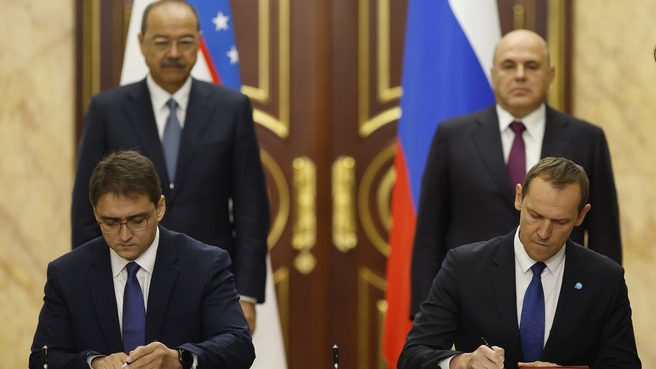
Signing documents following the meeting of the Russia-Uzbekistan Joint Commission at the level of heads of government, with Mikhail Mishustin and Prime Minister of Uzbekistan Abdulla Aripov. Documents were signed by Head of the Federal Service for State Registration, Cadastre and Cartography Oleg Skufinsky and Deputy Foreign Minister of the Republic of Uzbekistan Bobur Usmanov
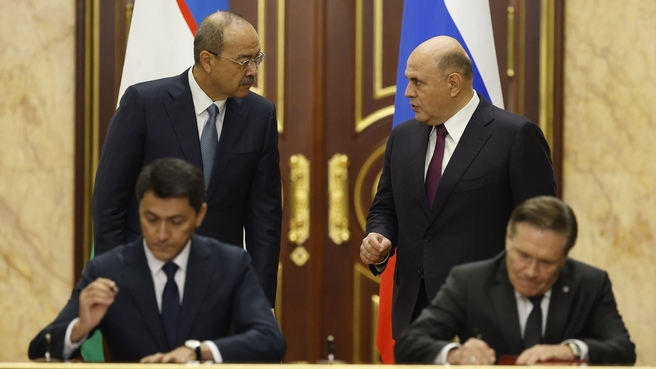
Signing documents following the meeting of the Russia-Uzbekistan Joint Commission at the level of heads of government, with Mikhail Mishustin and Prime Minister of Uzbekistan Abdulla Aripov. Documents were signed by Director General of State Atomic Energy Corporation Rosatom Alexei Likhachev and Minister of Health of Uzbekistan Amrillo Inoyatov
Mikhail Mishustin and Prime Minister of Uzbekistan Abdulla Aripov
We are glad to welcome you all in Moscow. The fourth meeting of the Russia-Uzbekistan Joint Commission at the level of heads of government has actually been taking place for a couple of days now. I know that many of my colleagues came here in advance, met with their counterparts and discussed a lot of topical issues on our joint agenda.
This format was created in agreement with the presidents, Shavkat Mirziyoyev and Vladimir Putin, and allows us to discuss the most pressing issues on our mutual agenda in detail, and to jointly determine the prospects for further interaction in priority areas, primarily in trade, economic, investment, scientific and technical, cultural and humanitarian spheres.
We will review the main issues on our agenda. I suggest focusing on efforts to expand cooperation in industry, agriculture, energy, the high-tech sector, education and medicine. Relations between Russia and Uzbekistan are based on principles of neighbourliness, partnership and allied collaboration. Our nations are linked by a long common history.
Together, we are expanding trade and economic cooperation and effectively addressing our mutual issues, despite the attempts of ill-wishers to sow discord in our cooperation.
We see Uzbekistan as a leading economic partner in the Central Asian region. In turn, Russia is Uzbekistan’s number one trade partner.
Despite the complicated international situation, we are consistently strengthening our economic and investment ties. Last year, mutual trade volumes exceeded 600 billion roubles, a 25 percent increase. In January-July 2023, this indicator grew by almost 14.5 percent to about 470 billion roubles.
I am absolutely sure that the potential for Russian and Uzbek economic cooperation is much greater. There are many opportunities for expanding collaboration in new fields.
Of course, we will take our relations to a new level under the Declaration on Comprehensive Strategic Partnership signed by our presidents.
We welcome Uzbekistan into Eurasian integration as an observer state, and we are doing much collaborative work through this. Uzbekistan is partnering with the EAEU member countries in several spheres.
Mr Abdulla Aripov, I would like to thank you and all our esteemed Uzbek colleagues for taking part in this Eurasian Intergovernmental Council meeting, and in the Eurasian Congress and Youth Forum in Sochi this past June.
We are convinced that Uzbekistan’s involvement in Eurasian integration will create favourable conditions for national economic development, for raising people’s well-being and for expanding business and investment activities.
I would like to note that integration collaboration cushions the impact of the negative external situation. This is due to stable production and logistics chains, and to using modern digital economic and other technologies.
We believe it is possible to expand contacts between businesses. The largest Russian companies are expanding their presence in Uzbekistan. Their total investment accounts for 20 percent of overall foreign investment volumes. The number of joint industrial, agro-business, textile industry and transport infrastructure projects continues to increase.
We believe that energy ranks among the most promising sectors. The establishment of a new modern gas processing facility at the Kandym cluster of gas fields, as well as the exploration of Skakhpakhty and Jel gas fields, are a good example of this cooperation.
Another important initiative is the construction of a nuclear power plant in Uzbekistan using Russian technology. This was a decision by presidents Vladimir Putin and Shavkat Mirziyoyev. The difficulties with electricity that Uzbekistan faced last winter justify this project, as does the relevance of choosing peaceful nuclear development.
The nuclear power plant will help cover Uzbekistan’s demand for electricity, create thousands of jobs and fulfil the industrial potential of the country.
One more objective is the improvement of transport connectivity between our states and all Eurasian space. We are working to draft a comprehensive cooperation programme for the development of railway transport in Uzbekistan. And, Russian investors are ready to participate in the modernisation of airport infrastructure.
Of course, we prioritise the further steps in the development of the North-South international corridor. As we have said, this corridor will be able to compete with the Suez Canal for cargo traffic, and implementing it will help boost trade and economic cooperation between all participants.
We are ready to work more closely to expand transit routes in our common Eurasian space, including those leading to Afghanistan and South Asia.
It is necessary to continue increasing the distribution of agricultural products, first as part of the Agroexpress project. A plan was signed in June. The initiative has proven very successful; it helps provide for an expedited delivery of goods and gives additional opportunities to our producers, including small and medium-sized businesses.
The next priority is deepening our region-to-region relations. Over 80 Russian regions enjoy trade and economic relations with our Uzbek partners. The leaders are Moscow, St Petersburg, Tatarstan, Bashkortostan, and the Moscow, Chelyabinsk, Orenburg and Sverdlovsk regions.
We need to bring new participants into such partnerships and fill them with concrete initiatives for the further growth of our national economies and improving the wellbeing of the people.
Last spring, Tashkent hosted the “INNOPROM. Central Asia” international industrial expo. It featured some 60 exhibitions under the common motto Made in Russia. Seventeen Russian regions presented their investment and industrial potential.
Such platforms are currently sought-after to exchange best practices, sign contracts, promote products and generally improve industrial policy. We hope that Uzbekistan will take part in the next Innoprom expo which is to be held next summer in Yekaterinburg.
I would also like to invite our Uzbek partners to the Russia International Exhibition and Forum. This will open in early November at the All-Russian Exhibition Centre (VDNKh) in Moscow. It will showcase our country's achievements in recent years, including the experience of regional development and the implementation of projects aimed at improving the quality of people's lives.
We propose that the Republic of Uzbekistan present our joint projects in various sectors in its pavilion. We will be happy to invite visitors to the exhibition to see our mutual cooperation.
Humanitarian ties are of great importance for strengthening neighbourliness. They create a reliable basis for expanding direct contact between people.
Large cultural events are held annually in Russia and Uzbekistan. These include concerts and guest performances, exhibitions and educational events. Our cooperative cross-culture days have become a very good tradition. Also, the unique project, ”Russian Seasons,“ is being held successfully in Uzbekistan this year.
We will continue to cooperate in education. In terms of the number of students at Russian universities, Uzbekistan is a leader among all countries. Of the more than 60,000 Uzbek students in Russia, almost 14,000 are receiving an advanced education under state grants.
In this new academic year, the government quota for young people from Uzbekistan at Russian higher education institutions has been increased from 650 to 800 students.
The network of Russian university branches is expanding in the republic. Among them are Moscow State University, Moscow State Institute of International Relations, Herzen Pedagogical University, Gerasimov Institute of Cinematography (VGIK) and many others. In the future, new branches will be opened. In this way, young people will have more opportunities to receive a quality and modern education.
We are also ready to build several schools in Uzbekistan, where education will be conducted in the Russian language, using Russian school curricula. In this way, students will be able to become better acquainted with Russian culture and traditions. If you are interested, we will consider this further.
Colleagues,
I believe that the potential of Russian-Uzbek trade and economic co-operation has not yet been fully realised. Our common task is to jointly bring our business ties to a higher level in the near future, and based on equality, mutual respect and consideration for each other's interests. I know that we can do this.
I would like to wish everyone productive work.
Now, I am pleased to give the floor to the Prime Minister of Uzbekistan, Esteemed Abdulla Aripov. Please.
Abdulla Aripov: Thank you very much. Mr Mishustin, colleagues; I am happy to see you again.
On behalf of the Uzbek delegation, allow me to express my deep gratitude and appreciation to our Russian colleagues for their traditionally warm welcome and hospitality. First of all, to you, Mr Mishustin.
I would like to begin my speech by fulfilling the instructions of the President of Uzbekistan: to convey heart-felt greetings and wishes from President of the Republic of Uzbekistan Shavkat Mirziyoyev, to President of the Russian Federation Vladimir Putin, and of course, to you personally, Mr Mishustin.
Today, Uzbek-Russian relations of comprehensive strategic partnership and alliance have reached a fundamentally new level. In recent years, our interstate interaction has increased, and multifaceted and productive cooperation is growing dynamically. Undoubtedly, this was possible because of the strategic course set by the presidents of Uzbekistan and the Russian Federation.
Our governments have specific tasks of further promoting cooperation and practical implementation of the agreements reached. I completely support you, Mr Mishustin: today's opportunities for expanding cooperation have not been fully realised. There are many different areas where we can develop our interaction.
I am happy to see highly intense contacts at all levels. The co-chairs of the intergovernmental commission are in constant contact. Representatives of Uzbekistan, as you noted, have taken an active part in various events held by the Russian Federation. So, in addition to what you have listed, I would like to note that our high-level representatives took part in the St Petersburg Economic Forum, the Innoprom industrial exhibition in Yekaterinburg, and the International Economic Forum in Kazan.
As you noted, the “INNOPROM. Central Asia” third international industrial exhibition was held successfully in Tashkent in April. It has already become a tradition. As a result, agreements worth more than $10 billion were signed.
Russia has remained our key foreign economic partner. Over the last five years, the annual growth rate of mutual trade has averaged 20 percent.
We believe that this year we will be able to fulfil our presidents’ goals of increasing trade to the equivalent of $10 billion. In order to achieve this, it is important to continue working together to create favourable conditions and remove barriers to mutual trade.
The volume of Russian investment in Uzbekistan is growing. Over the past three years, the number of enterprises with Russian capital has doubled. Today this is close to 3,000 companies.
Projects related to industrial cooperation in the mining and smelting sector, energy, chemicals, agriculture, machine-building and electrical engineering are being actively implemented.
Collaboration is continuing with Russian companies to create a new package of investment projects. Mr Mishustin, many new projects have been developed. Interest in cooperation and productive joint work is very high. Close interaction with the leading financial institutions, with Russian banks has been built.
A promising area for cooperation is the creation of joint industrial parks. The chemical technology park, Chirchik, is operating successfully in the Tashkent Region. In April, a technology park project in Uzbekistan’s Jizzakh Region was launched. Work is underway to prepare an agreement on the creation of similar tech-parks in the Navoiy and Bukhara regions.
A significant contribution to the development of cooperation is being made through interregional interaction, as you just said, Mr Mishustin. Thus, in the first half of this year alone, delegations from the two countries’ regions have made some 50 reciprocal visits.
We hope that the holding of a regular interregional cooperation forum in Tatarstan in early October will also result in new agreements.
Another important area is transport and logistics cooperation. I completely agree with you. It is gratifying that the shipping volume of all kinds of transport between our countries has grown significantly. The creation of new transport corridors will help our countries enter new and promising markets.
We support the development of one of the main transport arteries on the Eurasian continent, the North-South international corridor. We are interested in the joint launch of the new multimodal transport corridor Belarus-Russia-Kazakhstan-Uzbekistan-Afghanistan-Pakistan. An important aspect of the implementation of this initiative is the construction of a railway on the trans-Afghan corridor.
Undoubtedly, we have a great cooperation potential in tourism. In the first six months of 2023, almost 350,000 Russian tourists visited our country. This trend is supported by an increasing number of flights between our countries. We are ready to further expand the geography of flights.
We highly value the support of the Russian Federation’s leadership in issues related to labour migrants. We will appreciate a prompt decision on signing an agreement on mutual pension support. It is also important to amend the agreement on organised recruitment and expedite the opening of the representative offices of Uzbekistan’s Agency for Foreign Labor Migration Affairs in the Russian regions.
The exchange of experience in healthcare is in high demand. This year, we successfully held the 1st Uzbekistan-Russia Medical Forum. We suggest continuing this practice. We are interested in new projects aiming to jointly manufacture medical preparations, drugs and other medical goods at Pharma Park in Tashkent.
We also cooperate in higher education. Today, as you noted, 14 branches of leading Russian universities operate in Uzbekistan. We are also actively expanding cooperation in preschool and school education. The Classroom and Child projects have won critical acclaim. They help improve the professionalism of educators and Russian language teaching methods in Uzbekistan. Under this Classroom project, we suggest increasing the number of educators, specifically, those teaching mathematics, physics and chemistry, at Russian-language schools. We are very grateful for proposals to build Russian-language schools. I would like to note that Russian-language schools account for 10 percent of Uzbekistan’s 10,000-plus secondary schools. In the past few years, cultural and humanitarian cooperation has been elevated to a new level. Last year, Moscow and St Petersburg successfully hosted the Days of Culture of Uzbekistan and the Days of Uzbek Cinema. The Bakhor State Dance Ensemble of Uzbekistan performed in Nizhny Novgorod, Yekaterinburg, Ufa, Kazan and St Petersburg.
This year, Uzbekistan is hosting major events under the Russian Seasons international cultural project. The production, 12, directed by Nikita Mikhalkov, workshops by Russian State University of Cinematography and other cultural events took place successfully at various venues in Uzbekistan. The ballet performance Lazgi: Soul and Love Dance, a ballet performance by members of the Uzbekistan National Ballet Company, recently debuted at the State Academic Bolshoi Theatre in Moscow and was very successful. We are very grateful to the Russian side for providing this venue.
Mr Mishustin, we are firmly committed to expanding close cooperation with our Russian partners in the future. Members of Uzbekistan’s delegation who were at today’s meeting of the joint commission are ready to discuss all current issues, to jointly chart new points of growth and to draft mutually acceptable plans.
Yesterday, we spoke with our colleagues who have been here for two days now. There are many new projects that are not yet included into the agreement. Of course, we will continue this effort. We have finalised a number of documents. We believe that they can form the relevant framework. We have many diverse and worthwhile projects that will benefit both the Uzbek and Russian sides.
Documents signed following the meeting of the Joint Commission at the level of heads of government of the Russian Federation and the Republic of Uzbekistan
Joint communiqué on the 4th meeting of the Joint Commission at the level of heads of government of the Russian Federation and the Republic of Uzbekistan.
Signed by: Prime Minister of the Russian Federation Mikhail Mishustin and Prime Minister of the Republic of Uzbekistan Abdulla Aripov.
Agreement between the Ministry of Industry and Trade of the Russian Federation and the Ministry of Investment, Industry and Trade of the Republic of Uzbekistan.
Signed by: Deputy Minister of Industry and Trade of the Russian Federation Oleg Bocharov and Deputy Minister of Investment, Industry and Trade of the Republic of Uzbekistan Khurram Teshabayev.
Agreement between the Federal Service for State Registration, Cadastre and Cartography (Russian Federation) and the Ministry of Economy and Finance of the Republic of Uzbekistan on the provision by the Russian Federation of gratuitous technical assistance to the Republic of Uzbekistan for the creation of a system of state cadastral evaluation in 2023-2024.
Signed by: Head of the Federal Service for State Registration, Cadastre and Cartography Oleg Skufinsky and Deputy Foreign Minister of the Republic of Uzbekistan Bobur Usmanov.
Memorandum of Understanding between the State Atomic Energy Corporation Rosatom (Russian Federation) and the Ministry of Health of the Republic of Uzbekistan on strategic partnership in the field of nuclear medicine.
Signed by: Director General of the State Atomic Energy Corporation Rosatom Alexei Likhachev and Minister of Health of the Republic of Uzbekistan Amrillo Inoyatov.
Plan to expedite the joint work on the full functioning of the Tashkent branch of the federal state autonomous education institution of higher education Pirogov Russian National Research Medical University under the Ministry of Health of the Russian Federation.
Signed by: Rector of the Federal State Autonomous Education Institution of Higher Education Pirogov Russian National Research Medical University under the Ministry of Health of the Russian Federation Sergey Lukyanov and Minister of Health of the Republic of Uzbekistan Amrillo Inoyatov.
